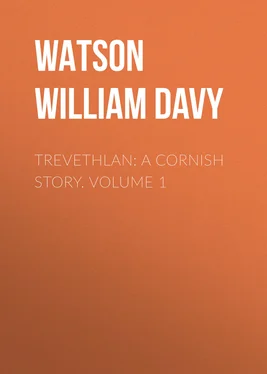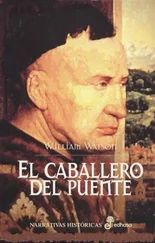William Watson - Trevethlan - A Cornish Story. Volume 1
Здесь есть возможность читать онлайн «William Watson - Trevethlan - A Cornish Story. Volume 1» — ознакомительный отрывок электронной книги совершенно бесплатно, а после прочтения отрывка купить полную версию. В некоторых случаях можно слушать аудио, скачать через торрент в формате fb2 и присутствует краткое содержание. Жанр: foreign_prose, foreign_antique, на английском языке. Описание произведения, (предисловие) а так же отзывы посетителей доступны на портале библиотеки ЛибКат.
- Название:Trevethlan: A Cornish Story. Volume 1
- Автор:
- Жанр:
- Год:неизвестен
- ISBN:нет данных
- Рейтинг книги:5 / 5. Голосов: 1
-
Избранное:Добавить в избранное
- Отзывы:
-
Ваша оценка:
- 100
- 1
- 2
- 3
- 4
- 5
Trevethlan: A Cornish Story. Volume 1: краткое содержание, описание и аннотация
Предлагаем к чтению аннотацию, описание, краткое содержание или предисловие (зависит от того, что написал сам автор книги «Trevethlan: A Cornish Story. Volume 1»). Если вы не нашли необходимую информацию о книге — напишите в комментариях, мы постараемся отыскать её.
Trevethlan: A Cornish Story. Volume 1 — читать онлайн ознакомительный отрывок
Ниже представлен текст книги, разбитый по страницам. Система сохранения места последней прочитанной страницы, позволяет с удобством читать онлайн бесплатно книгу «Trevethlan: A Cornish Story. Volume 1», без необходимости каждый раз заново искать на чём Вы остановились. Поставьте закладку, и сможете в любой момент перейти на страницу, на которой закончили чтение.
Интервал:
Закладка:
Their family—a sore point was this with Mrs. Pendarrel, who foresaw that in some shape her own manœuvre must be repeated—consisted of two daughters, Gertrude and Mildred. Gertrude was nearly thirty, married, but without offspring: Mildred was not quite twenty. In appearance, they both resembled their mother, and might be imagined to exhibit traces of the ancient people said, in some legends, to have founded Marazion.
Esther lost no time in fulfilling her purpose of visiting the orphans. As soon as possible after the despatch of the letter, she started for Pendarrel Hall, which, unlike Trevethlan Castle, was a modern mansion, surrounded by a large park. The day after her arrival, she drove to perform her errand.
Old Jeffrey had pondered much on the novel instructions received from his young master; and every sound of the gate-bell roused him to a great display of vigilance. First, he reconnoitred the party seeking admission, through a loop-hole: if that scrutiny were satisfactory, he opened a slit in the wicket, and held a parley: if this proved equally free from danger, he unclosed the wicket itself, and allowed the visitor to enter. Hitherto, he had not been called upon to pronounce the message of exclusion.
But the sound of an approaching carriage awoke all the caution of the old warder. Mrs. Pendarrel's chariot wound heavily up the now rugged road, which led through the base-court to the main gateway of the castle. The lady looked from side to side, and viewed the surrounding desolation with some secret triumph, as betokening a necessity which must be glad to accept relief. At length her carriage drew up in front of the arched portal, and a servant alighted, and rang the bell with correct violence.
Old Jeffrey had sufficient shrewdness to know that such an attack as this could not be repelled from the loop-hole; so he descended to parley through the opening in the wicket.
"Now, sir," said the invading servant, "how long is my lady to wait?"
"Who did you want to see?" asked the porter in turn.
"Open the gates, sir: let us drive to the hall-door."
"Troth," said Jeffrey, "this is the hall-door just now. Who did ye want to see?"
Mrs. Pendarrel, slightly impatient, repeated her servant's demand from the window of the carriage: Jeffrey met it with the same question.
"Mr. Trevethlan," said the lady.
"Mr. Trevethlan's not at home," said the obstinate warder.
"Not at home, sir! What do you mean? Where is he?"
"He's not at home," Jeffrey repeated.
Mrs. Pendarrel mused for a moment.
"Miss Trevethlan is at home, I suppose?" she asked.
"Miss Trevethlan is not at home," was again the reply.
"This is insolence," the lady said. "Do you know, sir, who I am?"
"I think I know the Pendar'l liveries," answered Jeffrey.
"Home," said Mrs. Pendarrel to her servant. And the carriage rattled down the descent.
A young man was leaning on the gate of the base-court: as the chariot approached, he opened it, and stood cap in hand while the lady drove through. She pulled the check-string, and beckoned the stranger to the window.
"Do you belong to the castle?" she asked, when he drew near.
"No, in good truth, ma'am," the youth replied with a peculiar smile: "I am a tenant of Pendar'l."
"What is your name?"
"Sinson, ma'am; Michael Sinson at your service, ma'am; grandson of old Maud Basset."
"What!" exclaimed the lady hastily, "a relation–"
"The late Mrs. Trevethlan's nephew, ma'am," said Michael.
"Come to the hall to-morrow," Mrs. Pendarrel said; "I may be able to employ you."
Michael made a cringing bow, and the carriage drove on.
"So," mused its occupant, "it is war. The old spirit does animate the old ruin. A pleasant pastime, Henry Trevethlan, have you bequeathed to your children. Long shall your race rue the day, when you took a woman at her first word. Was not Esther Pendarrel worth asking twice? Was it impossible to conciliate her pride, except by the sacrifice of your own? Was no allowance to be made for the petulance of a girl nursed by flattery? Was there no middle course? Might not Trevethlan have been preserved, yet Pendarrel not extinguished? I smiled when you left me: I smiled when I saw your rapid gallop down the avenue: I smiled still, when I heard you were departed to London. No falconer's voice, methought, will be required, 'to lure my tassel-gentle back again.' A week—and another, and another—and no news. A month, and news. His kinsman comes. To intercede for him? Ah, no. To tell me of his folly, and to plead for himself. 'There is no fury like a woman scorned.' I listened, but it was long before I consented. A bold wooer truly was my worthy lord! Did he not venture to urge, that his nephew's passion was so ardent, it would prevent him from any other union? That therefore the castle would descend to him? That so the properties would be united in my name? That he loved me more—oh, cant and hypocrisy, how I loathed you at the time! Yet I listened, and listened, and in my wrath and for my sorrow, consented. Did I drive you to ruin, Henry Trevethlan? Did I embitter your days? Alas! mine have been equally dark. Proud man, I ask again, why did you trample on me? Why might we not minister to our mutual happiness, instead of running a race for revenge? I could not, you knew I could not, unasked, revoke my words. Might I not have had the opportunity? And should I submit to my doom in patience?
"And you have bequeathed your hatred to your children. To the children of Margaret Basset. And, verily, they seem worthy of the trust. But they shall find their match in Esther Pendarrel. And now the plan of the campaign. I must learn the nature of the ground. Then, sound trumpets, and no quarter."
The following morning young Sinson fulfilled Mrs. Pendarrel's behest, by calling at the hall, where he had an interview of some length with its mistress. One of the park lodges, Wilderness gate, happened to be vacant at the time, and was assigned to Michael as a residence, in consideration of services, either past or to come, which were a mystery to the retainers of the family, among whom some jealousy was created by the preference.
Within a few days afterwards, Mrs. Pendarrel returned to London.
CHAPTER IV
"But can the noble mind for ever brood,
The willing victim of a weary mood,
On heartless cares that squander life away,
And cloud young genius brightening into day?
Shame to the coward thought that e'er betrayed
The noon of manhood to a myrtle shade!"
The Trevethlans, it has already been remarked, were a crotchetty race. One of their peculiarities was displayed in the disposition of their property. No portion had been entailed within the memory of man, and the whole had very frequently descended simply by inheritance. Wills were of rare occurrence among the family muniments, and marked the existence of disagreement. And now that cause was active, and produced its effect. A few days after Mr. Trevethlan's funeral, his children were summoned by the chaplain to hear the last desires of their parent, Mr. Griffith being also present with his account books.
The will which Polydore produced was very short and simple. The testator merely appointed the Rev. Polydore Riches and Mr. Edward Griffith, to be the guardians of his children, in case he died before they were of age, leaving his property to descend by inheritance. A short silence ensued when the chaplain finished reading the document: it was first broken by the steward.
"It is but a small patrimony," he said, "Mr. Trevethlan, that you inherit. A very small patrimony for the owner of this castle. And a sad trust is this for me, who can remember, when from the top of the watch-tower, we saw little that was not ours."
Читать дальшеИнтервал:
Закладка:
Похожие книги на «Trevethlan: A Cornish Story. Volume 1»
Представляем Вашему вниманию похожие книги на «Trevethlan: A Cornish Story. Volume 1» списком для выбора. Мы отобрали схожую по названию и смыслу литературу в надежде предоставить читателям больше вариантов отыскать новые, интересные, ещё непрочитанные произведения.
Обсуждение, отзывы о книге «Trevethlan: A Cornish Story. Volume 1» и просто собственные мнения читателей. Оставьте ваши комментарии, напишите, что Вы думаете о произведении, его смысле или главных героях. Укажите что конкретно понравилось, а что нет, и почему Вы так считаете.












